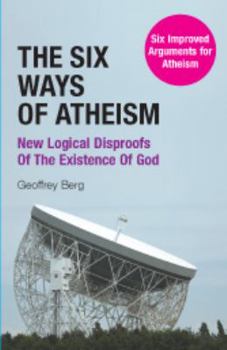The Six Ways of Atheism: New Logical Disproofs of the Existence of God: Six Improved Arguments for Atheism
Select Format
Select Condition 
Book Overview
Geoffrey Berg, a graduate of Cambridge University, England, believes the case for atheism has never been put in as forceful and logically cogent a way as it merits, least of all by the great... This description may be from another edition of this product.
Format:Hardcover
Language:English
ISBN:0954395662
ISBN13:9780954395667
Release Date:May 2009
Publisher:G. Berg
Length:175 Pages
Weight:0.32 lbs.
Customer Reviews
1 rating
Highly Recommended!
Published by Thriftbooks.com User , 14 years ago
The following is a rough draft of my review to be published at [...] Geoffrey Berg's The Six Ways of Atheism: New Logical Disproofs of the Existence of God is one of the most important books about Atheism that I have ever read. Berg provides half a dozen arguments to prove that God does not exist or at least that God's existence is improbable. Although all of them may not be valid, they are all intriguing and deserve to have a hearing. My discussion of them that follows must not be treated as a substitute for reading his book, as he goes out of his way to address many possible criticisms that might be launched against his arguments. Berg's first argument from atheism goes something like this: God is a being who is omnipotent, the creator of the universe, supremely good, and so on. But it must be statistically improbable for the creator of the universe to also possess attributes like supreme goodness which must occur in very few (if any) beings. To see this argument with more clarity, try thinking about it this way: suppose that tomorrow one person will win the lottery and one person will be struck by lightning. What are the odds that the lottery winner will be one and the same as the person who gets struck by lightning? Obviously, the odds are incredibly low that two improbable occurances will happen to the same person. Likewise, the odds that a rare (or perhaps even non-existent) attribute like supreme goodness will happen to exist in the unique being who created the universe is also improbable. I think that Berg's argument is a valid one, but it only goes to show that the existence of God is a priori improbable. Of course, with enough a posteriori support, the existence of God might be deemed probable in spite of its a priori improbability. Fortunately Berg seems to realize this and he attempts to show that the God hypothesis can recieve no a posteriori support in another argument, which we will examine next. Berg's second argument is the 'Comprehension Gulf' Argument. Berg asserts that since God is, by definition, immortal and infinite, that man can never recognize God and prove that God exists because man is finite and mortal. Man, being finite in both lifespan and knowledge, can never attain direct proof that something has existed for eternity. Therefore, we can never know if some being actually is God. At best we could only attain proof that some very powerful being exists who might be God, but who also might be simply a very powerful and long-lived spirit (who did not quite meet the definition of 'God'). Now this is a very interesting argument. If it is valid, it would go along very nicely with Berg's a priori proof that God is highly improbable because it effectively destroys any hope the theist might have of supporting the God hypothesis through a posteriori means. But is it valid? I don't know. If it were the case that all of humanity met some spiritual being who could stop bombs from exploding, make pink unicorns appear out of thi





